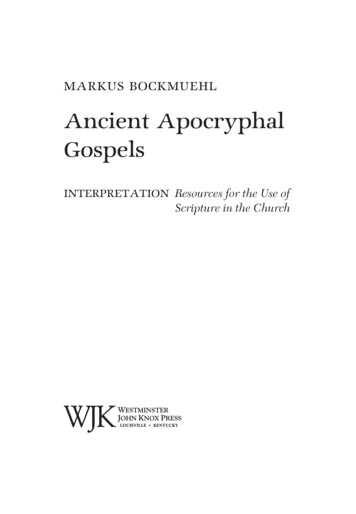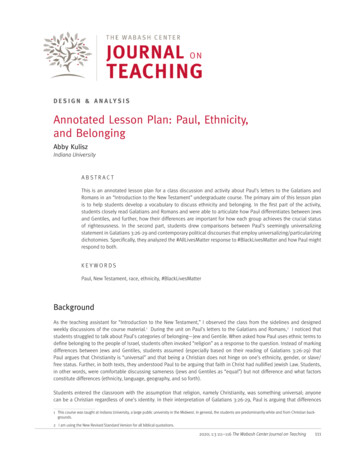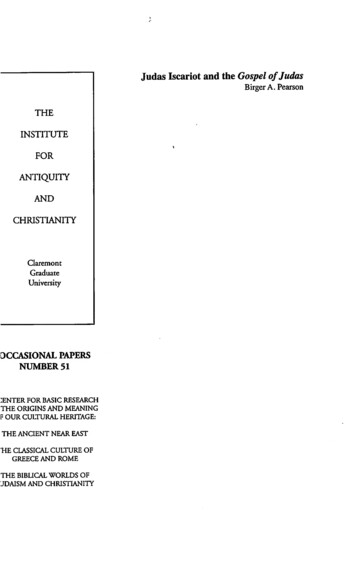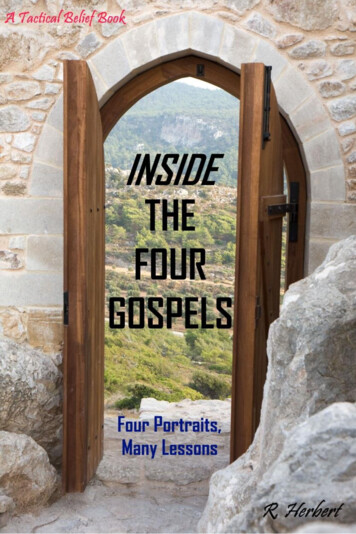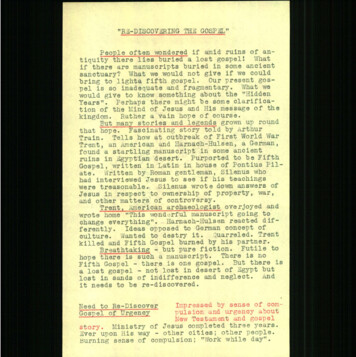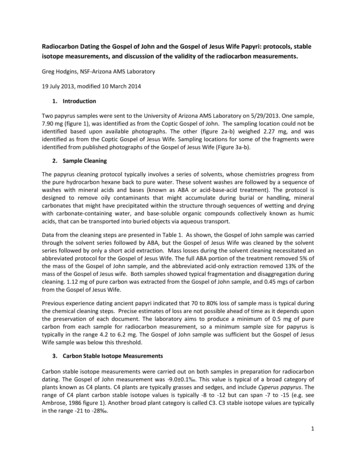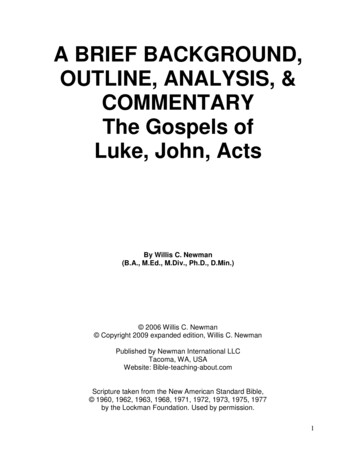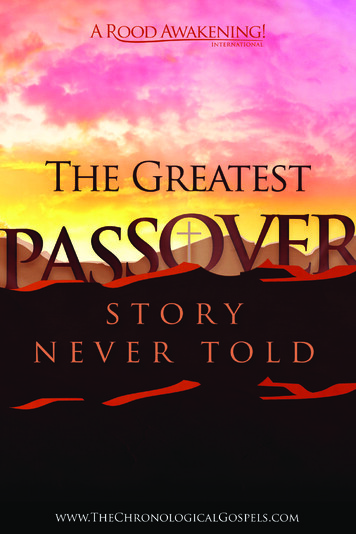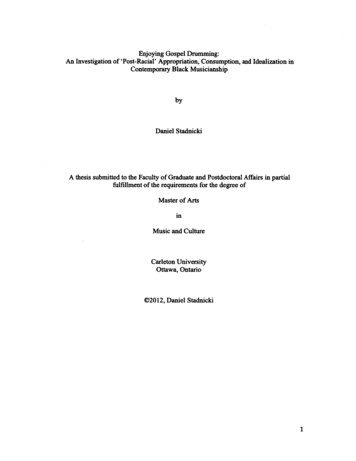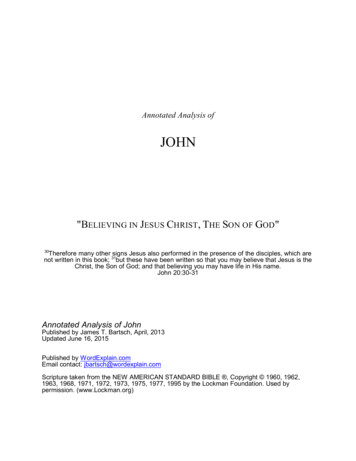
Transcription
Annotated Analysis ofJOHN"BELIEVING IN JESUS CHRIST, THE SON OF GOD"30Therefore many other signs Jesus also performed in the presence of the disciples, which arenot written in this book; 31but these have been written so that you may believe that Jesus is theChrist, the Son of God; and that believing you may have life in His name.John 20:30-31Annotated Analysis of JohnPublished by James T. Bartsch, April, 2013Updated June 16, 2015Published by WordExplain.comEmail contact: jbartsch@wordexplain.comScripture taken from the NEW AMERICAN STANDARD BIBLE , Copyright 1960, 1962,1963, 1968, 1971, 1972, 1973, 1975, 1977, 1995 by the Lockman Foundation. Used bypermission. (www.Lockman.org)
JOHN"BELIEVING IN JESUS CHRIST, THE SON OF GOD"Therefore many other signs Jesus also performed in the presence of the disciples, which arenot written in this book; but these have been written so that you may believe 1 that Jesus is theChrist, the Son of God; and that believing you may have life in His name.John 20:30-31A 1 THE REACTIONS TO JESUS CHRIST, THE SON OF GOD 1 - 12B 1 The Period of General Belief 1 - 4C 1 The Witness of the Apostle John 1:1-18D 1 The nature of the Word 1:1-5E 1 His eternal Deity 1:1-2G 1 The Word's existence in the beginning : {1} In the beginning 2was 3 the Word, 4 1:1aG 2 The Word's existence with God: and the Word was with God,1Key verse (John 20:31) - believe: The verb "believe" occurs 98 times in John, appearing in every chapterexcept 15 and 18. Clearly it is the key word, and the anticipated response to the evidence of Jesus Christ as the Sonof God!21:1 - In the beginning: “Beginning” translates the Greek word archê (746). Some commentators opine that the“beginning” in John’s Gospel antedates the “beginning” of Genesis. That is possible, but not necessary. The term“beginning” denotes a beginning of something. Why couldn’t it be the same beginning as that of which Moseswrote? I think the burden of proof rests on the shoulders of those who claim there are two different beginnings. Ithink John, like Moses, spoke here of the beginning of the creation of the physical universe of which man is anintegral, if microscopic part.31:1 - was: The implication of the imperfect tense of the word “to be” (eimi) is that whenever the beginning was,the Word was already existing! The imperfect tense signifies ongoing action in past time. Literally, the phrase reads,“In the beginning the Word was being .”41:1 - the Word: Clearly, “the Word” (ho logos - 3056) metaphorically refers to Jesus of Nazareth, who became“the Christ” (Messiah) when He was anointed by God with His Spirit immediately following His baptism (John 1:2934; Matt. 3:13-17; Mark 1:9-11; Luke 3:21-22). Four times in this opening prologue John refers to Jesus as the Word(logos) – 1:1 3X; 1:14 1X. Why did John call Jesus “the Word” of God? Because Jesus is the very expression ofGod. He clearly manifests as well as describes who God is. When we spend time with another person, we begin tolearn what that person is like by his speech. So Jesus clearly revealed who God is by His very existence and Hisactivities and His speech here upon earth.It is significant that in the Old Testament, Jesus often appeared as the Messenger of the LORD. In the NewTestament Jesus appeared as the Message of God. For further study on Jesus as the Messenger of the LORD, see“The Angel of Yahweh” – l .1
Annotated Outline of John’s Gospel, by James T. Bartsch, WordExplain.com521:1bG 3 The Word's existence as God: and the Word was God. 6 1:1cG 4 The Word's existence in the beginning with God: {2} He wasin the beginning with God. 1:2E 2 His creativity 1:3G 1 The Word's creation of all things: {3} All things came intobeing through Him, 7G 2 The exclusion of anything existing apart from the Word: andapart from Him nothing came into being that has come intobeing.E 3 His essence – life which enlightens 1:4-5G 1 His possession of life: {4} In Him was life, 1:4G 2 His life as being light for men: and the life was the Light ofmen. (1:4a) 1:4-5H 1 His light as shining in the darkness: {5} The Light shines51:1 - the Word was with God: Again, John uses the imperfect tense the verb “to be” (eimi). In the beginning, theWord “was being” with God. “With” translates pros. This carefully worded statement means distinctness. Withoutdenying the unity of the Godhead (Deut. 6:4), John states distinctness within the Godhead. One God, but more thanone Person. If you are “with” someone, you are not identical to that person. We Christians do not believe in multipleGods. There is One God, but He exists in three distinct persons – Father, Son, and Holy Spirit. God anointed His Sonwith the Holy Spirit, and when Jesus prayed (Matt. 26:39), He was not talking to Himself! “With” for practicalpurposes, here means “proximity” not “identity.”61:1 - and the Word was God: Literally, the word order of the Greek text is as follows: “and God was being theWord.” In English it sounds as if God, in the indefinite past, was in the process of being the Word. But that is notwhat John meant. First, both “God” and “the Word” appear in the nominative case. John placed “God” first because,according to Greek syntax, he wanted to emphasize the “Godness” of the “Word.” So He placed the word “God” firstfor emphasis. He dropped the article “the” from in front of “God” not to assert, as Jehovah’s Witnesses claim, thatJesus was merely “a god” and thus a created being; but rather to assert the quality of “Godness” that the Word waspossessing already when the beginning began. So the Word partakes of the same essence as God. Yet the two aredistinct persons, for John has already stated that “the Word was being with God.”71:4 - All things came into being through Him: The Bible affirms that God, through Christ, the Second Person ofthe Godhead, created everything that exists (Gen. 1:1-2:4; Exod. 20:11; John 1:3, 10; 1 Cor. 8:6; Col. 1:16; Heb.1:2), and that He did so in six solar days. Biblical Creationism also believes in the reality of the Global Flood in thedays of Noah that has left massive amounts of evidence all over the earth – billions of fossils and sedimentary rocklayers everywhere.The theory of Evolution is a hoax foisted upon the public by the scientific community and philosophers andeducators to avoid being accountable to the Creator. The theory of Evolution has insuperable logical and scientificdifficulties. Attempts to marry Biblical Creationism with the Theory of Evolution and its gargantuan time scale,including an ancient earth of 4.5 billion years, simply reveal the existence of theologians and exegetes who havebeen seduced and cowed by the Theory of Evolution. So-called “Theistic Evolution” and the belief in an ancientearth are inconsistent with a straightforward reading of the text of Scripture. See the Glossary entry for TheisticEvolution c Evolution). See the off-site article on BiblicalYoung Earth Creationism (http://www.nwcreation.net/ageyoung.html).
Annotated Outline of John’s Gospel, by James T. Bartsch, WordExplain.com3in the darkness, 1:5aH 2 The inability of the darkness to overpower the light: andthe darkness did not comprehend it. 8 1:5bD 2 The mission of John the Baptist – to bear witness to the light 1:6-8E 1 The person of John 1:6G 1 A man: {6} There came a manG 2 Sent from God: sent from God,G 3 Named John: whose name was John.E 2 Purpose of John 1:7-8G 1 His entry: as a witness: {7} He came as a witness, 1:7G 2 His task: to bear witness concerning the light: to testify aboutthe Light,G 3 His mission: so that all might believe through him.G 4 The disclaimer: {8} He was not the Light, 1:8G 5 His arrival: to bear witness concerning the light: but he cameto testify about the Light.D 3 The effect of the light 1:9E 1 The designation of the light – the true light: {9} There was the trueLightE 2 The means of enlightenment – coming into the world: which,81:5 - the darkness did not comprehend it: Though katalambano (2638) can mean to perceive or comprehend aswell as to take down or overpower, the primary meaning here has to be overpower for two reasons: 1) the cognitiveaspect of katalambano is attached to human beings, not darkness; 2) in the other associations of darkness withkatalambano the word has the sense of an evil force overpowering someone. It is not impossible that a secondarysense of perceiving exists as well (a Divine play on words, if you will) as the context indicates in John 1:11, 12.The significance may well be that Satan, the prince of darkness, was unable to conquer the light. Evil, wroughtby evil angels and evil men, was unable to conquer Jesus. In a secondary sense, the world of men, living in darkness,for the most part did not perceive or receive the light.Two statements about darkness worth noting:John 12:35 So Jesus said to them, "For a little while longer the Light is among you. Walk while you havethe Light, so that darkness will not overtake you; he who walks in the darkness does not know where hegoes.1 Thessalonians 5:4 But you, brethren, are not in darkness, that the day would overtake you like a thief;
Annotated Outline of John’s Gospel, by James T. Bartsch, WordExplain.com4coming into the world, 9E 3 The effect of the light – lighting every man: enlightens every man.D 4 The reception of the Word 1:10-13E 1 Rejection--by his creation 1:10-11G 1 The ambivalence of the world 1:10H 1 His existence in the world: {10} He was in the world,H 2 His prior creation of the world: and the world was madethrough Him,H 3 The world's ignorance of Him: and the world did notknow Him.G 2 The rejection of His people 1:11H 1 His having come to His own things: {11} He came toHis own, and those who were His own did not receiveHim.H 2 His rejection from His own people: and those who wereHis own did not receive Him.E 2 Reception – by some, who became God's children 1:12-13G 1 The reception of some: {12} But as many as received Him,1:12H 1 Their gift from Him – the authority to become children ofGod: to them He gave the right to become children ofGod,H 2 The further description of those “receiving” Him – theones believing in His name: even to those who believe inHis name,G 2 The description of their supernatural birth: {13} who wereborn,1:13H 1 Not of bloods: not of blood 1091:9 - coming into the world: KJV translates this, "That was the true Light, which lighteth every man that comethinto the world." NIV "The true light that gives light to every man was coming into the world." The latter meaningfits the syntax better and makes more sense. See David Brown, JFB, V, 347.101:13 - not of blood: Literally, “not of bloods.” Those who are born spiritually are not born of a succession ofhumans, but born of God.
Annotated Outline of John’s Gospel, by James T. Bartsch, WordExplain.com5H 2 Nor from the will of flesh: nor of the will of the fleshH 3 Nor from the will of a male: nor of the will of man,H 4 But from God were they born!: but of God.D 5 The glorious incarnation of the Word 1:14E 1 The Word became flesh: {14} And the Word became flesh,E 2 He tented among us: and dwelt among us, 11E 3 We beheld His glory: and we saw His glory,G 1 Glory as of an only begotten one from a father: glory as of theonly begotten from the Father, 12G 2 Glory full of grace and truth: full of grace and truth.D 6 The function of the Word 1:15-18E 1 To fulfill the Baptist's prophecy 1:15G 1 The certainty of his witness: {15} John *testified 13 about Him111:14 - and dwelt among us: It is incredible that the eternal Word, essentially God, should come tenting with ushumans. Reaching out to us, He descended from His great celestial abode in the spiritual realm to go camping withus here on the earth!This word “dwelt” is skenoo, 4637, and is used 5X, all by John. Those in Revelation refer either to those whotent in heaven (presumably humans living up away from their natural abode, the earth) or to God who determines totent among us humans forever, sending the New Jerusalem out of heaven down to the earth (Revelation 21:3).Though skenoo reflects a temporary dwelling place, with God and Christ it does not reflect impermanence, but onlydifferentness--God leaving His normal abode to come and live with us in an artificial (to Him) realm. When Goddecides to inconvenience Himself out of love for His created beings, He attaches Himself to a permanent residencein a foreign country!121:14 - only begotten from the Father: The two words “only begotten” translate the single Greek wordmonogenês (3439). Contrary to what I have long-believed, this word does not apply only to Jesus and Hisrelationship to God. It refers, for example, to a dead man who was the only son of his widowed mother (Luke 7:12).In Luke 8:42 Jairus, the synagogue official, who had an only daughter about twelve years old who was dying. Havingdescended from the “Mount of Transfiguration,” Jesus was confronted with a man yelling, “Teacher, I beg you tolook at my son, for he is my only boy . (Luke 9:38). Literally, “for my only begotten he is.” In Hebrews 11:17,Abraham was lauded for his faith in offering up Isaac, “.and he who had received the promises was offering up hisonly begotten son.” The other five uses in the NT all come from the hand of the apostle John, and all five refer toJesus (John 1:14, 18; 3:16, 18; 1 John 4:9).Here is a literal rendering of John 1:14: “And the word flesh became, and tented among us; and we beheld hisglory – glory as of an only begotten from a father, full of grace and truth.” I think the point John makes here is this –a man who has only one child – a son – bestows great honor upon that son. That son is his pride and joy. That is thekind of honor God bestowed upon the Word. It should be noted that the Greek word father (patêr, 3962), bears noarticle (a, an, the). It is the quality of relationship that John describes here, not the fact that this only begotten son hasa particular father.131:15 - testified: In a trial of Muslim extremists accused of bombing the World Trade Center in New York, a witnessfor the prosecution stunned the courtroom when he described a man in a yellow van that was supposedly used in thebombing. When asked to identify the suspect, he pointed to a seated juror! The witness had failed in his most
Annotated Outline of John’s Gospel, by James T. Bartsch, WordExplain.com6and cried out, saying,G 2 His identification of Jesus: "This was He of whom I said,G 3 The priority of Jesus: 'He who comes after me has a higherrank than I,G 4 The prior existence of Jesus: for He existed before me.'"E 2 To exhibit grace 1:16-17G 1 Our reception of His fullness: {16} For of His fullness we haveall received, 1:16aG 2 Our reception of grace upon grace 1:16b-17H 1 Our reception of His grace: and grace upon grace. 1:16bH 2 The giving of the Law through Moses: {17} For the Lawwas given through Moses; 1:17aH 3 The coming of grace and truth through Jesus Christ! graceand truth were realized through Jesus Christ. 1:17bE 3 To reveal the Father 1:18G 1 The invisibility of God from man's point of view: {18} No onehas seen God at any time;G 2 The declaration of God byH 1 The only-begotten God: the only begotten GodH 2 The one being in the bosom of the Father: who is in thebosom of the Father,H 3 He has explained Him: He has explained 14 Him.C 2 The Witness of John the Baptist 1:19-34D 1 His own identity 1:19-28E 1 Not the Messiah 1:19-20G 1 The source of the testimony: {19} This is the testimony offundamental task – to identify the suspect! John the Baptist was a superb and accurate witness in regard to Jesus, theMessiah.141:18 - explained: Exegeomai to declare forth or to explain. Jesus, by His life and ministry here on earth, hasaccurately explained God to us humans.
Annotated Outline of John’s Gospel, by James T. Bartsch, WordExplain.com7John, 1:19aG 2 The occasion of the testimony: when the Jews sent to himpriests and Levites from Jerusalem to ask him, "Who are you?"1:19bG 3 The certainty of the testimony: {20} And he confessed and didnot deny, but confessed, 1:20aG 4 The essence of the testimony: "I am not the Christ." 1:20bE 2 Not Elijah or that prophet 1:21G 1 Their question about Elijah: {21} They asked him, "What then?Are you Elijah?" 15G 2 John’s denial: And he *said, "I am not."G 3 Their question about “the Prophet”: "Are you the Prophet?" 16G 4 John’s denial: And he answered, "No."E 3 The prophesied way-preparer for the Lord 1:22-28G 1 As prophesied by Isaiah 1:22-23H 1 The persistent query of the representatives from the Jews1:22J1Their direct question: {22} Then they said to him,"Who are you,J2Their motive: so that we may give an answer tothose who sent us?J3Their repeated question: What do you say aboutyourself?"H 2 The response of John: {23} He said, "I am A VOICE OFONE CRYING IN THE WILDERNESS, 'MAKESTRAIGHT THE WAY OF THE LORD,' as Isaiah the151:21 - Are you Elijah? This question was prompted by Yahweh’s prediction in Malachi 4:5-6, {5} "Behold, Iam going to send you Elijah the prophet before the coming of the great and terrible day of the LORD. {6} "He willrestore the hearts of the fathers to their children and the hearts of the children to their fathers, so that I will not comeand smite the land with a curse." Many have speculated that Elijah will be one of the two witnesses testifying onGod’s behalf during the Tribulation (Rev. 11:1-14).161:21 - Are you the Prophet? This question was prompted by Moses’ prediction of another prophet like himselfwhom Yahweh their God would raise up for them. Heeding that prophet’s message would be of paramountimportance. Disobedience would be summarily (even fatally) dealt with (Deut. 18:15-19). The prophet to whichMoses referred was none other than the Messiah, Jesus of Nazareth.
Annotated Outline of John’s Gospel, by James T. Bartsch, WordExplain.com8prophet 17 said." 1:23G 2 As baptizing 1:24-26aH 1 The source of John’s interrogators: {24} Now they hadbeen sent from the Pharisees. 1:24H 2 Their follow-up question – “Why was he baptizing?”{25} They asked him, and said to him, "Why then are youbaptizing, 1:25J1if you are not the Christ,J2nor Elijah,J3nor the Prophet?"H 3 John’s acknowledgment of his practice of baptizing: {26}John answered them saying, "I baptize in water, 1:26aG 3 As unworthy of his superior 1:26b-28H 1 His deference to his superior, unknown to them: butamong you stands One whom you do not know. 1:26bH 2 John’s preceding Him: {27} "It is He who comes afterme, 1:27aH 3 John’s graphic description of his own unworthiness incomparison to the One coming: the thong of whosesandal I am not worthy to untie." 1:27bG 4 The location of the interrogation: {28} These things took placein Bethany beyond the Jordan, where John was baptizing. 1:28D 2 The identity of Jesus 1:29-34E 1 The pre-existent sin-bearer 1:29-31G 1 The dramatic testimony of John 1:29H 1 The occasion of the testimony: {29} The next day he*saw Jesus coming to himH 2 The stunning content of the testimony: and *said,"Behold, the Lamb of God who takes away the sin of the171:23 - Isaiah the prophet: The reference is to Isaiah 4:3-5, in particular, to v. 3. The initial portion of the versesthere refers primarily to the First Advent of the Messiah; the latter portion to His Second Advent.
Annotated Outline of John’s Gospel, by James T. Bartsch, WordExplain.com9world! 18G 2 John’s identification of Jesus as the One of whom he had beenspeaking: {30} "This is He on behalf of whom I said, 'After mecomes a Man who has a higher rank than I, for He existedbefore me.' 1:30G 3 John’s prior ignorance of Jesus’ identity: {31} "I did notrecognize Him, 1:31aG 4 The goal of his baptism – to assist in manifesting Jesus toIsrael: but so that He might be manifested to Israel, I camebaptizing in water." 1:31bE 2 The anointed Messiah 1:32-33aG 1 John’s testimony of having witnessed Jesus’ anointing asIsrael’s Messiah: {32} John testified saying, "I have seen theSpirit descending as a dove out of heaven, and He remainedupon Him. 19 1:32G 2 John’s initial unawareness of Jesus’ destiny: {33} "I did notrecognize Him, 1:33aG 3 The source of John’s information about Jesus: but He who sentme to baptize in water said to me, 1:33bG 4 The phenomen of the Holy Spirit’s descent: 'He upon whomyou see the Spirit descending and remaining upon Him, 1:33cE 3 The Baptizer with the Spirit: this is the One who baptizes in the HolySpirit.' 1:33dD 3 His testimony that Jesus is the Son of God: {34} "I myself have seen, and181:29 - who takes away the sin of the world: Here is clear testimony from the prophet John that Jesus’ deathwould be of sufficient value to pay for all the sins of all the people of the world of all time. This mitigates againstCalvin’s doctrine of “Limited Atonement,” that Christ died only for the sins of the elect. Christ died for the sins ofall. But Christ’s death actually benefits only those who believe in Jesus (John 3:16, 36).191:32 - He remained on Him: The Holy Spirit’s descent from the Father to remain upon the Son marks thebeginning of Jesus’ anointment with the Spirit. In other words, this is the precise point at which the eternal Logos ofGod became the Ultimate Messiah, or Christ of God. “Christ” and “Messiah” are human terms. They identify God’sselection of a human to be His chosen “Anointed One.” “Anointed” to be what? There are three offices that areanointed – that of Prophet, that of Priest, and that of King. When Jesus served here upon earth, His ministry wasprimarily that of Prophet. His present ministry up in heaven is primarily that of Priest (after the order ofMelchizedek, as the writer of Hebrews so eloquently testifies). His future ministry when He returns to the earth willbe that of King. God has, indeed anointed Jesus with His Spirit, as all the Gospel writers testify (Matt. 3:16-17; Mark1:10; Luke 3:22; John 1:32). No man has yet anointed Jesus with olive oil. That, I believe, will await His return toearth and the abject repentance of His people (Zech. 12:10-13:1).
Annotated Outline of John’s Gospel, by James T. Bartsch, WordExplain.com10have testified that this is the Son of God." 20 1:34C 3 Jesus' Acquisition of Disciples 1:35-51D 1 From John the Baptist 1:35-41E 1 The investigation of John and Andrew 1:35-40G 1 The situation of John and two disciples: {35} Again the nextday John was standing with two of his disciples, 21 1:35G 2 His pronouncement about Jesus: {36} and he looked at Jesus asHe walked, and *said, "Behold, the Lamb of God!" 1:36G 3 The response of the two disciples: {37} The two disciplesheard him speak, and they followed Jesus. 22 1:37G 4 The question of Jesus: {38} And Jesus turned and saw themfollowing, and *said to them, "What do you seek?" 1:38aG 5 The disciples’ question in reply: They said to Him, "Rabbi(which translated means Teacher), where are You staying?"1:38bG 6 Jesus’ tantalizing response: {39} He *said to them, "Come, andyou will see." 1:39aG 7 The action of the disciples 1:39bH 1 Their following Jesus: So they came and saw where Hewas staying;201:34 - this is the Son of God: In what sense is Jesus the Son of God? It can be argued that in this passage, atleast, Jesus is the Son of God because He is the Son of David. God had promised David centuries earlier that Hewould have a “Father-Son” relationship with David’s descendants (2 Sam. 7:14). This relationship was furtherpredicted in Psalm 2:7-9. There again, the “Father-Son” relationship is between God and David’s descendant, theUltimate Messiah. Jesus’ Messianic position is fully revealed here in John as well as in the other gospels. AsMessiah, Jesus is the Son of God. Similarly, the writer of Hebrews associates Jesus’ superiority as “Son” with Hisbeing the Messiah, the Son of David (Hebrews 1:5). This can be borne out by the writer’s having quoted Psalm 2:7and 2 Sam. 7:14 and 1 Chron. 17:13.21John 1:35 - disciples: These were disciples of John the Baptist, and they shortly became disciples of Jesus.This is the first occurrence of the word “disciple” (learner, mathêtês, 3101) in John’s Gospel, where it appears 78times in 73 verses. According to J. Dwight Pentecost (unpublished class notes), there are three levels of discipleship– the curious, the convinced, and the committed. A learner can be curious about Jesus but never become convinced,and thus, never believe in Him. The merely curious may eventually become disillusioned with Jesus and depart fromHim (John 6:66). Our job, as those who are assigned to “make disciples” (mathêteuô, 3100) (Matt. 28:19) is to helppeople become curious about Jesus, convinced that He is the Messiah (believe – John 3:16), and then becomecommitted to following Him (Rom. 12:1-2). The noun “disciple” is found only in the four Gospels and in the book ofActs. The verb “to disciple” is found but four times in the entire NT – 3X in Matthew (Matt. 13:52; 27:57; 28:19)and 1X in Acts (Acts 14:21).221:37 - they followed Jesus: It is instructive to observe that at least two of Jesus’ disciples had already beendisciples of John the Baptist. At the time they had met Jesus, they were already receptive to the idea of discipleship.
Annotated Outline of John’s Gospel, by James T. Bartsch, WordExplain.com11H 2 Their remaining with Jesus: and they stayed with Himthat day, 23H 3 The time of day: for it was about the tenth hour. 24G 8 The identification of one of the two converts: {40} One of thetwo 25 who heard John speak and followed Him, was Andrew,Simon Peter's brother. 1:40E 2 The conclusion of Andrew 1:41G 1 The action of Andrew: {41} He *found first his own brotherSimonG 2 The assertion of Andrew: and *said to him, "We have foundthe Messiah" (which translated means Christ).D 2 Simon Peter 1:42E 1 Andrew’s bring Peter to Jesus: {42} He brought him to Jesus.E 2 Jesus’ renaming of PeterG 1 His old name: Jesus looked at him and said, "You are Simonthe son of John;G 2 His new name: you shall be called Cephas" (which is translatedPeter).D 3 Philip 1:43-44E 1 Jesus’ plan to travel to Galilee: {43} The next day He purposed to gointo Galilee, 1:43aE 2 His finding of Philip: and He *found Philip. 26 1:43bE 3 His invitation to Philip: And Jesus *said to him, "Follow Me." 1:43c231:39 - they stayed with him that day: The point of John’s statement, apparently, is that the two of them spentthe better part of a complete day with Jesus, for at that point the day was yet young – it was only the tenth hour of theday.241:39 - about the tenth hour: NASB footnote: “Perhaps 10 a.m. (Roman time)”251:40 - one of the two: John has a subtle way of not identifying himself in this document. It seems likely that hewas the unidentified disciple here. Why else would have included the incidental fact that it was about the tenth hour?How would he have known that if he were not an eye-witness? John and his brother James were sons of Zebedee.They were fishermen. Andrew, the other investigator concerning Jesus, was also a fisherman – his brother’s namewas Peter. These two sets of brothers apparently worked in close proximity together at times in the fishing business(Matt. 4:18-22). It would not, therefore, be remarkable that Andrew and John would spend time together.261:43 - He found Philip: Probably in Galilee, as evidenced by the description immediately following (1:44).
Annotated Outline of John’s Gospel, by James T. Bartsch, WordExplain.com12E 4 Philip’s home-town: {44} Now Philip was from Bethsaida, of thecity of Andrew and Peter. 1:44D 4 Nathanael 1:45-51E 1 Philip’s finding of Nathanael: {45} Philip *found Nathanael 1:45aE 2 His identification of Jesus as the Messiah 1:45bG 1 Their finding the One: and *said to him, "We have found HimH 1 Witnessed by Moses: of whom Moses in the LawH 2 Witnessed by the Prophets: and also the Prophets wroteH 3 His identification of Jesus by name: —Jesus of Nazareth,the son of Joseph."E 3 His initial skepticism 1:46G 1 Nathanael’s cynical response: {46} Nathanael said to him,"Can any good thing come out of Nazareth?"G 2 Philip’s unruffled invitation: Philip *said to him, "Come andsee."E 4 Jesus' omniscience 1:47-48G 1 Jesus’observation of Nathanael: {47} Jesus saw Nathanaelcoming to Him, 1:47aG 2 Jesus’ remark about Nathanael’s integrity: and *said of him,"Behold, an Israelite indeed, in whom there is no deceit!" 271:47bG 3 Nathanael’s dumbfounded response: {48} Nathanael *said toHim, "How do You know me?" 1:48aG 4 Jesus’ omniscient reply: Jesus answered and said to him,"Before Philip called you, when you were under the fig tree, Isaw you." 28 1:48bE 5 His conclusion--Jesus is God's So: {49} Nathanael answered Him,1:49271:47 - no deceit: Evidently Jesus, supernaturally of course, identified the single trait by which Nathanaelsteered his life – honesty. If there was one thing Nathanael endeavored to maintain, it was his own integrity. Hecouldn’t believe that Jesus knew his guiding philosophy!281:48 - I saw you: In the mind of Nathanael, there was no way on earth Jesus could have known Nathanael’swhereabouts. Jesus must be omniscient to have known about Nathanael’s solitude under the fig tree!
Annotated Outline of John’s Gospel, by James T. Bartsch, WordExplain.com13G 1 His identification of Jesus as Teacher: "Rabbi,G 2 His identification of Jesus as the Son of God: You are the Sonof God; 29G 3 His identification of Jesus as the King of Israel: You are theKing of Israel." 30E 6 Jesus' prediction of greater miracles 1:50-51G 1 Jesus’ comment on the basis for Nathanael’s faith: {50} Jesusanswered and said to him, "Because I said to you that I saw youunder the fig tree, do you believe? 1:50aG 2 His prediction of greater miracles: You will see greater thingsthan these." 1:50bG 3 His prediction that Nathanael would one day see Him in all Hisglory as the Son of Man: {51} And He *said to him, "Truly,truly, I say to you, you will see the heavens opened and theangels of God ascending and descending on the Son of
Jun 16, 2015 · Annotated Outline of John’s Gospel, by James T. Bartsch, WordExplain.com 3 in the darkness, 1:5a H 2 The inability of the darkness to overpower the light: and the darkness did not comprehend it. 8 1:5b D 2 The mission of John the Baptist – to bear witness to the light 1:6-8 E 1 The person

